Draper Hills Summer Fellows Class of 2014
Draper Hills Summer Fellows Class of 2014
Listed below are the public profiles for the 2014 class of Draper Hills Summer Fellows.
Nicolas Ducoté (Argentina) | Vugar Salamli (Azerbaijan) | Leonardo Nogueira (Brazil) | Côme Awoumou (Cameroon) | Elaine Díaz Rodríguez (Cuba) | Yussef Auf (Egypt) | Mostafa Shouman (Egypt) | Irakli Porchkhidze (Georgia) | Sonal Agnihotri (India) | Mandakini Surie (India) | Damelya Aitkhozhina (Kazakhstan) | Lorena Vázquez Ordaz (Mexico) | Batchimeg Migeddorj (Mongolia) | Stanley Ibe (Nigeria) | Olatunbosun Tijani (Nigeria) | Shaban Khalid (Pakistan)| Varvara Pakhomenko (Russia) | Betty Tushabe (Rwanda) | Amira Yahyaoui (Tunisia) | Arthur Larok (Uganda) | Mustafa Nayyem (Ukraine) | Huong Le (Vietnam)| Jamila Ali Rajaa (Yemen) | Okay Machisa (Zimbabwe) | Irene Petras (Zimbabwe)
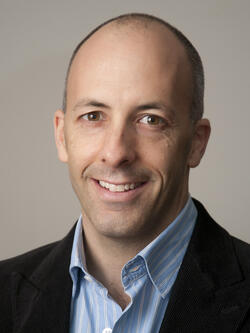
Nicolas Ducoté
ARGENTINA
Nicolas Ducoté is a democratic activist and civic leader based in Buenos Aires who has dedicated the last 25 years to strengthening civil society and democratic institutions in Argentina. Ducoté is a chief policy maker in the Ministry of Government for Buenos Aires, Argentina. After decades of work in NGOs and public service – including as undersecretary for political affairs of the City of Buenos Aires – Ducoté recently ran for office in his home district of Pilar and was elected to the local council. His prior experience includes: co-founding and leading the Center for the Implementation of Public Policies for Equity and Growth – one of Latin America´s top think tanks; and spearheading national initiatives to improve access to education, healthcare, and justice, as well as achieving political reform in several districts. Ducoté holds a bachelor of arts degree in international affairs from the Universidad de San Andrés, Argentina, and a master’s degree in public policy from Harvard University. He was a Gus Hart Fellow at the Chicago Council of Global Affairs in 2008 and the first Argentine ever selected as a Yale World Fellow in 2007.
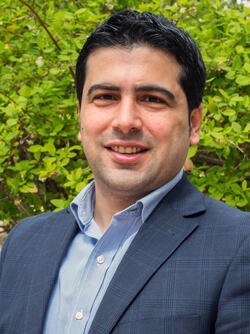
Vugar Salamli
AZERBAIJAN
Vugar Salamli is the co-founder of a prominent youth organization in Azerbaijan called OL! Movement. OL! works to promote democratic values, develop future leaders and build a culture of civic activism in Azerbaijan. At OL! Salamli manages a number of projects including an independent educational institution for alternative education – the Free Thought University. The project allows Azeri youth to engage in civic education, share experiences, exchange ideas and participate in open discussions on social issues. In 2010, the Free Thought University received the first annual Ambassadorial Award for Freedom of Expression over the Internet from the U.S. Mission to the Organization for Security and Cooperation.
Salamli is also a marketing specialist, with experience working for multinational companies including British Petroleum, Procter & Gamble and Carlsberg. He is an alumnus of the Hubert H. Humphrey Fellowship program, where he completed coursework in non-profit management, strategic planning and social media at the Evans School of Public Affairs at the University of Washington. Salamli completed his bachelor and master's degrees in finance at the Azerbaijan State University of Economics. He will start his master's degree in public administration at the Harvard Kennedy School of Government this fall.
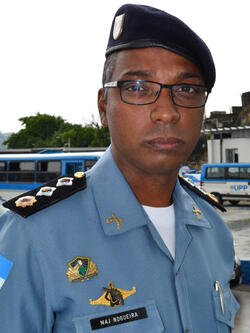
Leonardo Nogueira
BRAZIL
Leonardo Nogueira is a major for the military police of Rio de Janerio, Brazil, where he is the commander of the Police Pacification Unit (UPP) that is based in a slum complex in the city of São Carlos. The UPP, part of a recent public security policy in the slums of Rio de Janeiro, is working toward taking back control of regions dominated by organized crime and improving overall security inside the slums. Nogueira has worked in the military police for the past 13 years, holding such roles as chief of intelligence of the 35th military battalion and commander of the Mangueira and Cantagalo city Pacificiation Units. He is also a professor at the police training center and has developed community outreach programs through music, sport, dance, martial arts, community mobilization and alternative dispute resolution. Nogueira graduated from the Dom João Vi Military Police Academy and has a degree in geography from the State University of Rio de Janeiro, Brazil.
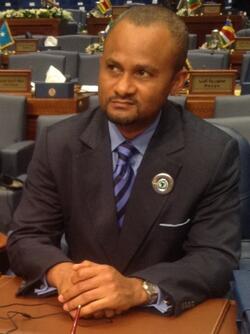
Côme Damien Georges Awoumou
CAMEROON
Côme Damien Georges Awoumou is a career diplomat currently working as an independent consultant for the Ministry of External Relations for the Republic of Cameroon. Awoumou has held several high-level positions in the Cameroonian public administration. He is the immediate outgoing director of cooperation and partnerships at the Ministry of Public Works, where he oversaw negotiations and contracts for bilateral and multilateral financing and technical cooperation and assistance for national infrastructure projects – particularly roads – for over five years. Previously, Awoumou served as the senior head of research, cooperation and partnerships at the same ministry, and headed the Partnerships and Facilitation Unit at the Ministry of Small and Medium Enterprises, Social Economy and Handicraft. Awoumou is also an experienced researcher and trainer with specific interest in governance in public service, as well as African and sub-regional integration, particularly in Central Africa. Awoumou holds a master’s degree in international relations from the International Relations Institute of Cameroon, a postgraduate diploma in political science and a master’s degree in political science, both from the University of Yaoundé II, Soa. He is currently completing doctoral research at the University of Poitiers, France, where he examines the issue of national sovereignty within the framework of regional integration mechanisms, the renouncement of law-making competences and the sincerity of Cameroon’s commitment to regional integration.
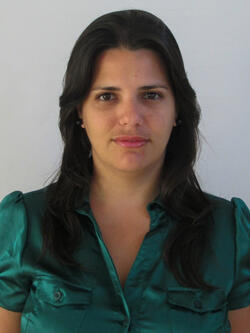
Elaine Díaz Rodríguez
CUBA
Elaine Díaz Rodríguez is a Cuban blogger, journalist and professor at the University of Havana where she teaches courses focusing on: digital journalism, communication, technology and society; and alternative journalism on the web. She has written about digital communication, technology infrastructure and the digital divide for Cuban and international outlets. From 2010 to 2012, Rodríguez worked as part of the local government of her municipality. In 2012, she took part in the Rio de Janeiro Human Rights & Technology Conference, along with entrepreneurs, executives, engineers, policy analysts, government representatives, human rights advocates and technologists. Rodríguez examined how the ICT industry can better plan for and manage the human rights implications of their technologies. She completed an MA in communications in 2014 at the University of Havana. She studied the current state of the Cuban blogosphere and its possibilities to promote processes of public deliberation and consensus-building.
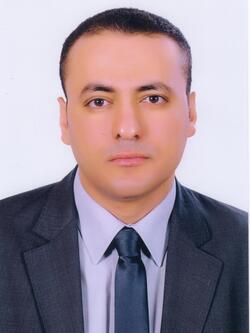
Yussef Auf
EGYPT
Yussef Auf is a nonresident fellow at the Atlantic Council's Rafik Hariri Center for the Middle East, a think tank based in Washington, DC. Auf focuses on constitutional issues, Islamic Sharia, elections and judicial matters. He has been a sitting judge in Egypt since 2007. From 2002 to 2007, he served as an agent for the public prosecutor, supervising a variety of electoral processes. From 2011 to 2012, Auf was a Hubert H. Humphrey fellow at American University’s Washington College of Law in Washington, D.C., where he trained with the Project on Middle East Democracy in the spring of 2012. He is a member of the Egyptian American Rule of Law Association. Auf’s work has appeared in the Carnegie Endowment for International Peace, Foreign Policy, Egypt Independent, Middle East Institute, Al Jazeera Centre for Studies and other publications. He holds an LLB and an LLM from Cairo University’s Law School and a diploma in Islamic studies from the Cairo Institute of Islamic Studies.
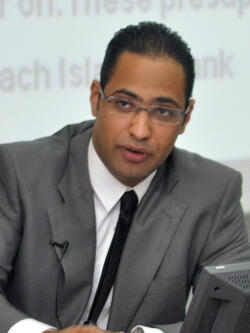
Mostafa Shouman
EGYPT
Mostafa Shouman is a development expert who works on promoting local governance and decentralization in Egypt. He is a consultant for the Egyptian Ministry of Labor and the Swedish Institute for Development, which works on local development issues in Egypt and the Middle East. Since his early career, Shouman has contributed to several organizations and initiatives advancing municipal development and social justice, particularly in empowering youth and women to increase their political engagement. In 2014, he lobbied successfully for the Egyptian constitution’s section on local development in favor of decentralization and fighting discrimination against youth and women. He has also trained more than 1,700 citizens around Egypt for municipal elections. Shouman is the technical and advocacy adviser for Mahliat, a grassroots initiative that campaigns to develop Egypt’s local administration. He completed his MSC at the German University in Cairo. He has completed several courses from Harvard University, the University of Washington and other institutions in the United Arab Emirates, Germany, Poland and Australia.
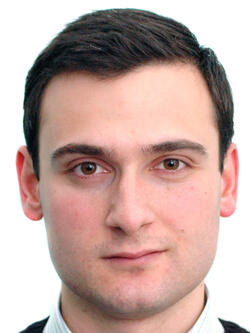
Irakli Porchkhidze
GEORGIA
Irakli Porchkhidze is the vice president of the Georgian Institute for Strategic Studies (GISS). GISS concentrates on producing analyses and commentaries on foreign policy, security, energy and geopolitical issues. In this capacity, Porchkhidze combines strategic and executive functions. From 2010 until October 2012, Porchkhidze served as the first deputy state minister for reintegration and was in charge of policy development for occupied territories of Georgia. He headed the Georgian delegation for the humanitarian working group at the Geneva Talks between Georgia and Russia. From 2008-2010, Porchkhidze served as the deputy secretary of the National Security Council of Georgia where he led the National Strategic Review process. This included the development of the National Threats Assessment Document that provided insights into the global, regional and local threat perception of the current Georgian government, the National Security Concept that describes fundamental national values, national interests and establishes the vision the main directions for national security policy and other strategic documents. From 2004-2006, he served as the first head of the Civil Registry Agency – the largest service delivery arm of the Ministry of Justice. Before joining the government, Porchkhidze worked at the Open Society Georgia Foundation managing programs designed to support rule of law and good governance initiatives. In 2011, he was awarded the Order of Honor by the President of Georgia. The Order of Honor is awarded to citizens who take part in the building process of independent government institutions or advanced social goals. Porchkhidze holds a master’s degree in international affairs and political science from the School of International and Public Affairs at Columbia University and Central European University in Budapest.
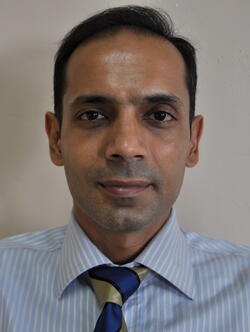
Sonal Agnihotri
INDIA
Sonal Agnihotri is the superintendent of police in the anti-corruption branch of the Central Bureau of Investigation (CBI), based in Kolkata, India. His responsibilities include: enforcement of anti-corruption laws at the federal level through in-depth investigations/inquiries; handling complaints; gathering intelligence against suspect public servants; and ensuring the successful prosecution of offenders. The CBI is India’s premier federal law enforcement agency for the investigation of corruption cases. As a member of the Indian Police Service with 10 years of field policing experience, Agnihotri has handled law enforcement for various parliament and state assembly elections in India. He has handled large-scale fraud cases dealing with developmental funds and organized community partnerships for crime prevention and development. Agnihotri was awarded the prestigious British Chevening Gurukul Fellowship in 2012. He holds an advanced diploma in French for which he was awarded a gold medal from the Himachal Pradesh University in India.
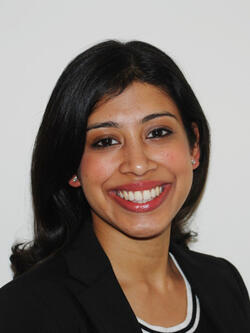
Mandakini Surie
INDIA
Mandakini Devasher Surie is a development practitioner with expertise on transparency and accountability issues in India. As a senior program officer with the Asia Foundation’s India office, she currently manages programs on transboundary water governance, intra-regional trade, right to information and development cooperation, with a focus on South Asia. The Asia Foundation is a non-profit, international organization committed to the development of Asia. Since 2004, Surie has supported efforts to enact and implement India’s landmark Right to Information Law. While working with the Commonwealth Human Rights Initiative and the Center for Policy Research in New Delhi, she supported civil society implementation efforts through legal analysis, research, training and capacity building for government and civil society actors. In 2005, she authored a user guide on the law, which has been translated into several Indian languages. She has also worked with the United Nations Development Program implementing India’s flagship National Rural Employment Guarantee Scheme, an Indian labor law and social security measure that ensures at least 100 days of guaranteed wage employment a year to rural households. In 2007, Surie received a Chevening Scholarship for an MSC in development studies at the London School of Economics and Political Science in the U.K. She also received a master’s degree in history from Jawaharlal Nehru University in India.
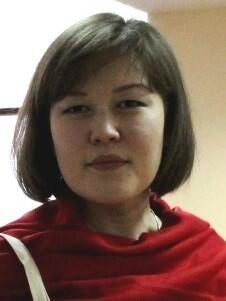
Damelya Aitkhozhina
KAZAKHSTAN
Damelya Aitkhozhina is a researcher on freedom of expression, assembly and association at Amnesty International, a global movement campaigning to end human rights abuses. She has expertise in human rights monitoring, reporting, advocacy and litigation, human rights education, capacity building of NGOs and government officials, and asylum regimes and statelessness in Kazakhstan and Central Asia. Since 1998, Aitkhozhina has worked on a number of projects aimed at protecting human rights and promoting rule of law in the Central Asian region and the Russian Federation. She has contributed to a number of organizations including: Street Law – a Kazakhstan human rights education project; the European Human Rights Advocacy Center; Russian Justice Initiative; the UN Tajikistan Office of Peace-building; the United Nations High Commissioner for Refugees Representative Office in Kazakhstan; the Office of the High Commissioner for Human Rights Regional Office for Central Asia; and the Legal Policy Research Center, Kazakhstan. Aitkhozhina was awarded the Chevening scholarship on behalf of the Foreign and Commonwealth Office, the Open Society Institute and the University of Essex, U.K. She holds an LLM in international human rights law from the University of Essex, U.K.
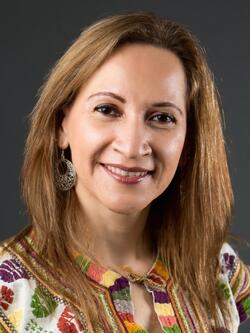
Lorena Vázquez Ordaz
MEXICO
Lorena Vázquez Ordaz has 13 years of experience as head of the national leadership for The Hunger Project, a non-profit organization committed to the sustainable end of world hunger. As country director for Mexico, Ordaz oversees the organization’s operations as they carry out gender-focused capacity building strategies in four states. Prior to joining The Hunger Project, Ordaz worked in information technology in Mexico and the United States. Ordaz has 19 years of experience in both the social and private sector. She is a member of various boards including the National Council of the Crusade Against Hunger, the Technical Advisory Council of the Federal Law for the Promotion of Activities of Civil Society Organizations and the Advisory Council on Civil Society in Mexico Inter-American Development Bank. She was a member of the Technical Council of Iniciativa México, a movement by members of civil society, private industry and academia to come together to improve Mexico, the Committee for Planning and Development of the State of Mexico and the Citizens Advisory Council of the Ministry of Social Development. Ordaz holds a bachelor’s degree in computer systems management from Instituto Tecnológico y de Estudios Superiores de Monterrey. She holds a number of diplomas, including non-profit management and poverty, gender and social development from various institutions. Ordaz is currently pursuing a master’s degree in superior international cooperation and development.
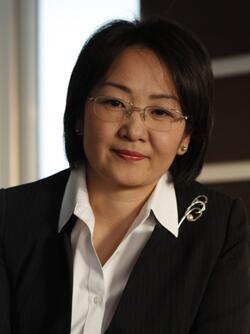
Batchimeg Migeddorj
MONGOLIA
Batchimeg Migeddorj was elected as a member of the Parliament of Mongolia in June 2012. As a former security and international relations researcher with more than a decade of experience at the Institute for Strategic Studies, Migeddorj is an active member of the Security and Foreign Policy Standing Committee, State Structures Standing Committee and others. At the parliament, Migeddorj’s priorities include accountability and democratic oversight of the executive and public service and political party reform. Previously, Migeddorj was a security sector practitioner and researcher on security and law enforcement reform. She has also served as the vice chair of the Mongolian Inter-Parliamentary Group and chair of both the parliamentary groups for the Organization for Security and Co-operation in Europe and Community for Democracies. She strives to devote her efforts to broadening foreign relations in Mongolia and the parliament. Migeddorj speaks fluent Chinese, English and Russian.
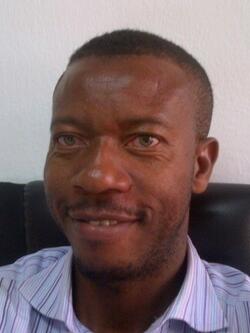
Stanley Ibe
NIGERIA
Stanley Ibe is a seasoned legal strategist, policy advisor, and international development practitioner with a proven record of driving impactful reforms across Africa. As Senior Partner at Goodshare & Maxwells, he leads the firm’s legal and policy advisory portfolio, working with governments, civil society, and academic institutions to design and deploy transformative solutions to justice, governance, and human rights problems.
Before joining the firm, Stanley led landmark criminal justice reform, regional norm development, and strategic litigation initiatives on the Africa Programme of the Open Society Justice Initiative. He has also held academic positions at two Nigerian universities, equipping the next generation of legal professionals with the skills to bridge global standards with local realities.
Stanley was a Commonwealth Scholar at the University of Oxford (2022-24), a Reagan-Fascell Democracy Fellow at the National Endowment for Democracy (2016-17), and a Draper Hills Summer Fellow at Stanford University’s Centre on Democracy, Development, and the Rule of Law (2014). He earned an MSc in International Human Rights Law from the University of Oxford, an MBA from the University of Essex, and an LL.M. from Maastricht University.
He serves on the General Assembly of ActionAid Nigeria, the inaugural Advisory Committee of African Network of Clinical Legal Education (ANCLE), and the Board of Trustees of Hope Behind Bars Africa (HBBA), among other leadership roles.
Updated Oct. 2025
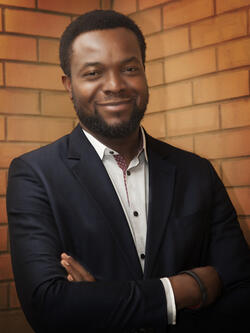
Olatunbosun Tijani
NIGERIA
Olatunbosun Tijani is an innovation expert with keen interest in knowledge application for economic and enterprise competitiveness. He is the CEO and co-founder of Co-Creation Hub Nigeria, a social enterprise committed to bringing together stakeholders from different walks of life to work collaboratively on solutions to social challenges faced by the average Nigerian. Tijani and his team run Nigeria’s first living lab for social technology ventures, investors, technologists, hackers and tech companies in and around Lagos. Tijani was the manager of VALOR, a European Commission funded project aimed at developing an effective Pan-European knowledge commercialization process and coordinated innovation policy. As a management consultant with the International Trade Centre, Hewlett Packard and Pera Innovation Network, he led a variety of innovation and business support initiatives for small businesses and public agencies in more than 12 countries across Europe and Africa. He also advised European universities on research and development funding. An avid believer in knowledge sharing and collaboration, Tijani enjoys developing learning programs, some of which include the European Research Network Commercialization and Funding Guide, the International Trade Centre Technology and Export Marketing Capacity Building Program, and the British Council Corporate Governance Training for SMEs (Nigeria). Tijani holds a BS degree in economics and a master’s degree in information system and management from the Warwick Business School, U.K.
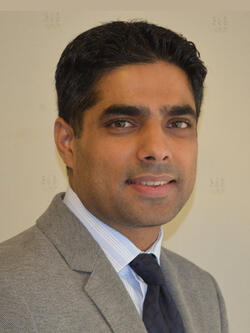
Shaban Khalid
PAKISTAN
Shaban Khalid is the president of the Islamabad Chamber of Commerce and Industry (ICCI), a trade body representing the business community of Islamabad, Pakistan. Khalid started his engagement with the ICCI in 2007-2008 when he initiated the Young Entrepreneurs Forum (YEF) – the only youth entrepreneurship initiative within any Chamber in Pakistan.
YEF works to inculcate an entrepreneurial mindset among the youth and provides leadership opportunities for them toward a progressive and prosperous Pakistan. YEF was selected as the founding member of the Commonwealth Asia Alliance of Young Entrepreneurs, an initiative supported by the Commonwealth Secretariat. Under Khalid's leadership, YEF conducted the first Anti-Corruption Survey and organized the first Indo-Pak Young Entrepreneurs Bilateral in 2013 – the only movement to create a linkage between the young entrepreneurs of Pakistan and India. Khalid was elected as the youngest senior vice president in 2008 and was elected president of ICCI in 2013 as the second youngest president of any chamber in Pakistan to date. He was also one of seven delegates from Pakistan to be invited to President Obama’s Summit on Entrepreneurship in Washington, D.C. in 2010.
He remains active in the family business of steel manufacturing and also heads his entrepreneurial venture of an automotive dealership. He volunteered and helped in relief efforts in Pakistan during the earthquake in 2005 and the floods in 2010.
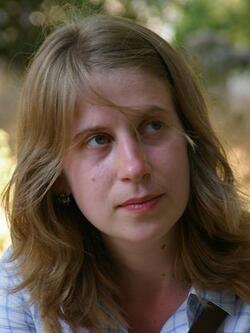
Varvara Pakhomenko
RUSSIA
Varvara Pakhomenko is a Moscow-based analyst at International Crisis Group, an independent, non-profit, non-governmental organization committed to preventing and resolving deadly conflict worldwide. She researches conflict related issues in the North Caucasus; carries out significant work in the field, including conducting interviews and liaising with local organizations; drafts and edits policy reports; and attends advocacy meetings at the national and internationallevel.
Since 2006 she has been focusing on North and South Caucasus issues, initially by working for Russian and international human rights NGOs. She has undertaken numerous research trips and activities in the South Ossetia and Abkhazia republics, whose independence from Georgia was recognized by Russia. After the 2008 war in Georgia, she assisted victims on both sides, especially hostages, helping them to seek redress in the national courts and at the European Court for Human Rights. She has produced a number of publications about the North and South Caucasus in Russian and foreign media.
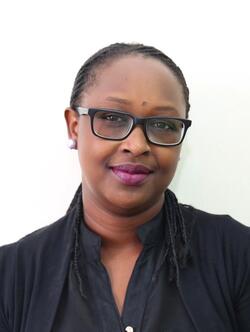
Betty Tushabe
RWANDA
Betty Tushabe is a Rwandan lawyer who specializes in issues of democratic governance, local governance, legal and judicial reform, public sector management and private sector development. At present, she works in the Strategy and Policy Unit (SPU) in the Office of the President of Rwanda, where she provides policy advice and undertakes research on specific issues, such as; state building, law making, media law reform, anti-corruption, access to justice issues and decentralization, among others.
The SPU is a department in the Presidency that solely provides policy advisory services to the president and provides oversight services with regard to ministries and government agencies in line with the country’s vision. Prior to joining SPU, Tushabe worked as a legal consultant, providing legal advice and support to the legislative drafting team at the Ministry of Justice, Kigali.
She holds an LLB (with honors) from Makerere University and received a dual degree LLM from New York University School of Law and National University of Singapore. She was also called to the Ugandan Bar in 2010.
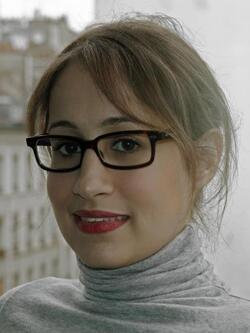
Amira Yahyaoui
TUNISIA
Amira Yahyaoui is a Tunisian human rights advocate. For the past decade, Yahyaoui has been active against Ben Ali's regime as a member of the Tunisian anti-censorship and freedom of speech movement. She had been stateless for several years in France until 2011. Following the revolution, she returned to Tunisia to follow the transitional period and the writing of the country’s constitution.
Yahyaoui is the president and founder of Al Bawsala, a public policy and accountability NGO promoting human rights in Tunisia. Al Bawsala is considered one of the most powerful NGOs in the country. Through its project, marsad.tn (“monitor” in Arabic), Al Bawsala monitors the work of the parliament, the executive branch and city halls using new technologies to make information accessible to citizens. Al Bawsala also advocates for the addition of many articles in the new constitution including gender equality and parity, access to information, freedom of speech, and independence of justice. In 2012, the organization won the OpenGov award for transparency and in 2013, the World Summit Award for its role as a parliament watchdog.
In 2012, Yahyaoui won the Vital Voices global trailblazer award as one of the "Women Transforming the Middle East and North Africa" and has been ranked by Arabian Business Magazine as one of the most powerful Arab women.
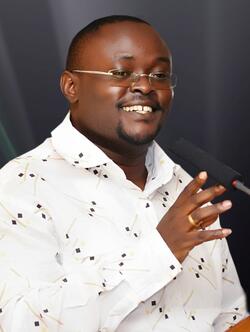
Arthur Larok
UGANDA
Arthur Larok is the country director of ActionAid Uganda, a national development organization. He serves as an affiliate member of ActionAid International, a global federation that works with poor people in overcoming poverty and its structural factors.
For the last 13 years, Larok has championed citizen action campaigns for justice in Uganda. In 2010, he spearheaded a remarkable citizen led mobilization to develop a Citizens Manifesto that has since become a hallmark for shaping political accountability in Uganda. In 2012, he was one of the architects of the Black Monday Movement, a defining face of citizen action against corruption and theft of public resources and donor aid. The movement continues to grow in Uganda and throughout Africa.
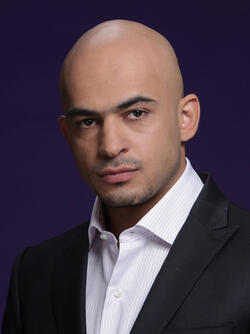
Mustafa Nayyem
UKRAINE
Mustafa Nayyem is a journalist and editor-in-chief of Hromadske.tv, the first independent internet-television platform in Ukraine. Today Hromadske.tv is a multimedia platform which responds to censorship in government and private media in Ukraine.
Nayyem is a correspondent for several media outlets, including Ukrainskaya Pravda – one of the most influential, reputable and independent online media sources in Ukraine. He covers political topics and conducts investigations on corruption in government agencies by revealing legal violations by top officials. He was an anchorman and analyst at TV Channel 5 - a Ukrainian television station launched in 2003. He is also one of the founders of the “Stop Censorship” movement, which defends free speech and democracy in Ukraine.
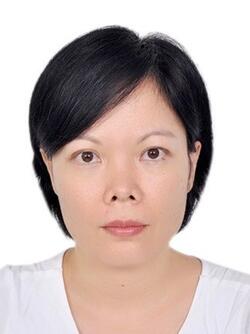
Huong Le
VIETNAM
Huong Le is a lawyer who works on justice and human rights issues in Vietnam. Since 2007, she has worked at the United Nations Development Program (UNDP) country office as a program officer where she manages the Rule of Law and Access to Justice Portfolio, with a specific focus on equality and non-discrimination against poor and marginalized people and the participation of civil society actors in law reform and public policy-making.
In 2013, Le joined a team of experts launching the first empirical justice index, which measures the performance of justice institutions and captures the main sources of tension emerging against the promotion of democratic processes and the building of a more coherent rule-of-law system in Vietnam. Prior to joining UNDP, Le held roles as a law lecturer, corporate lawyer and development practitioner.
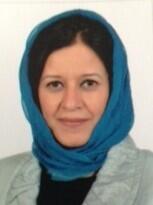
Jamila Ali Rajaa
YEMEN
Jamila Ali Rajaa is the head of Consult-Yemen, a political and development consultancy practice. Rajaa works as a political advisor and analyst. She is a researcher in state building matters, a gender and human rights advocate and development and media specialist.
She was one the female members of the Yemeni National Dialogue Conference, a forum which stemmed out of the transitional peace initiative. She recently joined the economic reform team which works on legislation and improving the business environment in Yemen. The team additionally drafted economic principles for the Yemeni constitution drafting committee. Following a study tour to Ethiopia, Rajaa and other representatives of the political parties and groups have drafted a division of power map according to established principals of federal governance. This draft was presented to the constitution drafting committee.
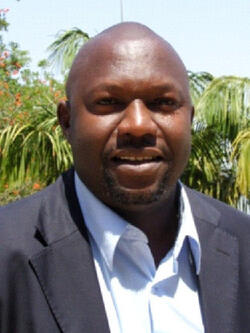
Okay Machisa
ZIMBABWE
Machisa has served as a human rights defender and prominent activist for civil, political and socioeconomic rights in Zimbabwe. Prompted by the rampant human rights abuses that rocked Zimbabwe after the formation of the only powerful opposition political party in the country – the Movement for Democratic Change – Machisa has advocated for a strong foreign policy toward Zimbabwe at international forums such as the Southern African Development Committee, the African Union, the European Union and the United Nations Human Rights Council.
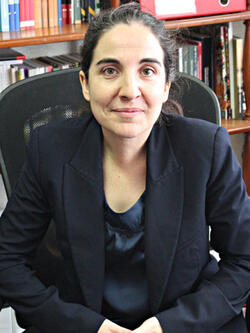
Irene Petras
ZIMBABWE
Irene Petras is a lawyer with 16 years of experience practicing law in Zimbabwe. Her areas of expertise include human rights, constitutional, media, criminal and electoral law and international litigation. Petras is the executive director of Zimbabwe Lawyers for Human Rights (ZLHR), an organization that provides legal support services, training and capacity-building to human rights defenders and seeks to foster a culture of human rights in Zimbabwe and the wider African region.
Prior to joining ZLHR, Petras practiced law at Kantor & Immerman Legal Practitioners, a human rights law firm based in the capital of Harare. She has also lectured on human rights and public international law at the University of Zimbabwe. She currently chairs the Zimbabwe Human Rights NGO Forum, a coalition of major human rights organizations in Zimbabwe, and is the vice chairperson of the Zimbabwe Election Support Network, the largest network promoting democratic elections in Zimbabwe.
Petras obtained her LLB (cum laude) at the University of Cape Town and herLLM in human rights law (with merit) at the University of London’s School of Oriental and African Studies.
